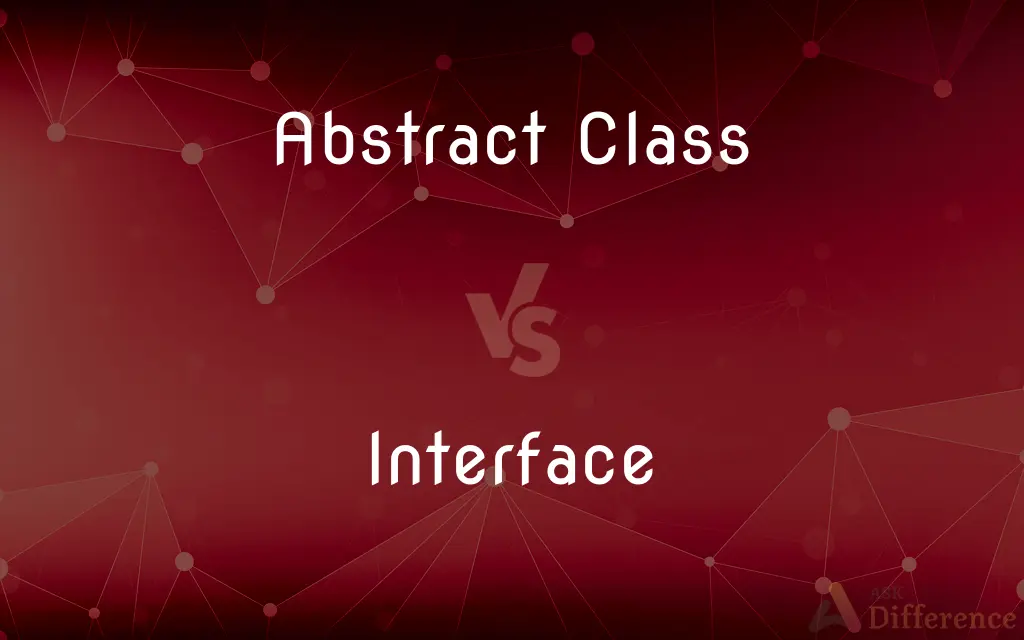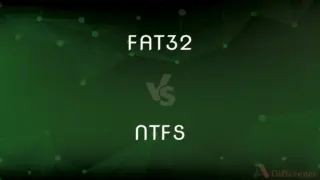Abstract Class vs. Interface — What's the Difference?
Edited by Tayyaba Rehman — By Fiza Rafique — Published on January 12, 2024
Abstract Classes can have implementation, Interfaces only declarations. Abstract Classes support inheritance, Interfaces multiple inheritances.

Difference Between Abstract Class and Interface
Table of Contents
ADVERTISEMENT
Key Differences
An Abstract Class is a class with one or more abstract methods, which subclasses must implement. An Interface is a blueprint for a class, defining a set of methods that implementing classes must fulfill.
An Abstract Class can have both abstract and concrete methods. Interfaces, traditionally, could only declare methods without implementation, though this has evolved in some languages.
Abstract Classes support single inheritance, meaning a class can only inherit from one abstract class. Interfaces allow multiple inheritances, enabling a class to implement multiple interfaces.
An Abstract Class can define member variables and constructors. Interfaces primarily focus on method signatures and, in some languages, static or default methods.
Abstract Classes are used when classes share a common structure or behavior. Interfaces are employed to define a contract for classes without dictating their structure.
ADVERTISEMENT
Comparison Chart
Method Implementation
Can have both abstract and concrete methods.
Initially only method declarations, now may include default methods.
Inheritance Type
Supports single inheritance.
Allows multiple inheritances.
Member Variables
Can have member variables and constructors.
Traditionally, no member variables (evolving in some languages).
Accessibility
Can have various access modifiers.
Usually public methods (some languages now allow private methods).
Design Purpose
Shares common structure/behavior among subclasses.
Defines a contract without enforcing structure.
Compare with Definitions
Abstract Class
A class that enforces certain methods to be implemented by its subclasses.
The Abstract Class 'DatabaseConnector' ensures all connectors have a 'connect' method.
Interface
A means for achieving multiple inheritances in languages like Java.
A class can implement both 'Drawable' and 'Clickable' Interfaces.
Abstract Class
A class that cannot be instantiated and may contain abstract methods.
The Abstract Class 'Shape' provides a template for its subclasses like 'Circle'.
Interface
A blueprint for classes that ensures certain functionalities.
The Interface 'Serializable' ensures classes have serialization capabilities.
Abstract Class
A superclass that provides a common structure for its subclasses.
The Abstract Class 'Animal' dictates common behavior for 'Dog' and 'Cat'.
Interface
A tool for decoupling the implementation from the interface.
The Interface 'PaymentProcessor' allows different payment method implementations.
Abstract Class
A base class that allows sharing of common code among derived classes.
The Abstract Class 'Employee' shares common attributes like 'name' and 'id'.
Interface
A surface forming a common boundary between adjacent regions, bodies, substances, or phases.
Abstract Class
A blueprint with partially implemented functionalities for subclasses.
The Abstract Class 'Vehicle' implements the 'startEngine' method for all vehicles.
Interface
A point at which independent systems or diverse groups interact
"the interface between crime and politics where much of our reality is to be found" (Jack Kroll).
Interface
A system of interaction or communication between a computer and another entity such as a printer, another computer, a network, or a human user.
Interface
A device, such as a cable, network card, monitor, or keyboard, that enables interaction or communication between a computer and another entity.
Interface
The layout or design of the interactive elements of a computer program, an online service, or an electronic device.
Interface
To join by means of an interface.
Interface
To serve as an interface for.
Interface
To serve as an interface or become interfaced.
Interface
Usage Problem To interact or coordinate smoothly
"Theatergoers were lured out of their seats and interfaced with the scenery" (New York Times).
Interface
The point of interconnection or contact between entities.
Public relations firms often serve as the interface between a company and the press.
Interface
A thin layer or boundary between different substances or two phases of a single substance.
If water and oil are mixed together, they tend to separate, and at equilibrium they are in different strata with an oil-water interface in between.
The surface of a lake is a water-air interface.
Interface
(computing) The point of interconnection between systems or subsystems.
The data is sent over the air interface to the remote system.
Interface
(computing) The connection between a user and a machine.
The options are selected via the user interface.
Interface
The connection between parts of software; also the public or published sections of an object or module,
This interface is implemented by several Java classes.
Traits are somewhat between an interface and a mixin, as an interface contains only method signatures, while a trait includes also the full method definitions; on the other side mixins include method definitions, but they can also carry state through attributes, while traits usually don't.
Interface
In object-oriented programming, a piece of code defining a set of operations that other code must implement.
The Audio and Video classes both implement the IPlayable interface.
Interface
(biochemistry) The internal surface of a coiled protein (compare exoface).
Interface
(transitive) To construct an interface for.
Interface
(ambitransitive) To connect through an interface.
Interface
(intransitive) To serve as an interface.
Interface
To meet for discussion.
Let's interface on Wednesday.
Interface
A surface forming a common boundary between two things, especially between two fluids.
Interface
Hardware that links one device with another (especially a computer).
Interface
That part of a computer program which controls the way a program interacts with a user; the manner of inputting and outputting of data, and the way information is presented on a computer monitor; also called user interface; as, a graphical user interface; a character-based interface.
Interface
(chemistry) a surface forming a common boundary between two things (two objects or liquids or chemical phases)
Interface
(computer science) a program that controls a display for the user (usually on a computer monitor) and that allows the user to interact with the system
Interface
The overlap where two theories or phenomena affect each other or have links with each other;
The interface between chemistry and biology
Interface
(computer science) computer circuit consisting of the hardware and associated circuitry that links one device with another (especially a computer and a hard disk drive or other peripherals)
Interface
A contract that classes can implement, defining a set of methods.
The Interface 'Flyable' mandates the implementation of a 'fly' method in classes.
Interface
A structure for defining public APIs without dictating the internal implementation.
The Interface 'List' defines methods like 'add' and 'remove' without implementation details.
Common Curiosities
What is an Abstract Class?
An Abstract Class is a class with abstract methods, serving as a template for subclasses.
Can an Abstract Class have concrete methods?
Yes, an Abstract Class can have both abstract and concrete methods.
Can an Abstract Class be instantiated?
No, an Abstract Class cannot be instantiated directly.
How do Interfaces support multiple inheritances?
Interfaces allow a class to implement multiple interfaces, achieving multiple inheritances.
What defines an Interface?
An Interface is a contract that defines a set of methods that implementing classes must fulfill.
Can Abstract Classes have member variables?
Yes, Abstract Classes can have member variables and constructors.
Are Abstract Classes and Interfaces mutually exclusive?
No, they serve different purposes and can be used complementarily in software design.
Are Interfaces limited to method declarations only?
Traditionally, yes, but some modern languages now allow default methods in Interfaces.
When should I use an Abstract Class?
Use an Abstract Class when you have a common structure or behavior for subclasses to share.
Can Interfaces contain static methods?
Yes, modern programming languages allow Interfaces to have static methods.
Do Interfaces have constructors?
No, Interfaces cannot have constructors.
Do Abstract Classes support polymorphism?
Yes, Abstract Classes support polymorphism through subclassing.
When is it appropriate to use an Interface?
Use an Interface when you need to define a contract for classes without enforcing a particular structure.
Can methods in an Interface have access modifiers?
Traditionally, Interface methods are public, but some languages now allow private methods.
Can a class implement multiple Interfaces?
Yes, a class can implement multiple Interfaces, adhering to all their contracts.
Share Your Discovery

Previous Comparison
FAT32 vs. NTFS
Next Comparison
6 Feet vs. 5’11 FeetAuthor Spotlight
Written by
Fiza RafiqueFiza Rafique is a skilled content writer at AskDifference.com, where she meticulously refines and enhances written pieces. Drawing from her vast editorial expertise, Fiza ensures clarity, accuracy, and precision in every article. Passionate about language, she continually seeks to elevate the quality of content for readers worldwide.
Edited by
Tayyaba RehmanTayyaba Rehman is a distinguished writer, currently serving as a primary contributor to askdifference.com. As a researcher in semantics and etymology, Tayyaba's passion for the complexity of languages and their distinctions has found a perfect home on the platform. Tayyaba delves into the intricacies of language, distinguishing between commonly confused words and phrases, thereby providing clarity for readers worldwide.













































